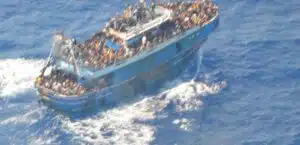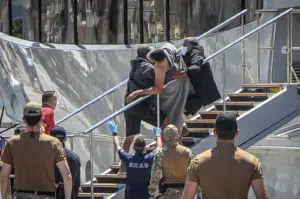Brussels – It is now Frontex’s turn to answer questions from the European Ombudsman, Emily O’Reilly, on indirect responsibility for violations of fundamental rights at the European Union’s maritime borders. After establishing the absence of direct responsibility and especially the European Border and Coast Guard Agency’s “over-dependence” on member states to intervene when boats carrying migrants are in danger, Frontex will have to respond “by June” to the Union’s inter-institutional body holding to account institutions, EU bodies, and agencies of practices not in line with their mandates, in particular to ascertain that it has done everything possible to avoid becoming involved in violations of international and European law by member countries during search and rescue operations at sea.
 The inter-institutional body’s Director of Investigations, Rosita Hickey, disclosed this today (April 8) during a hearing in the EU Parliament’s Committee on Civil Liberties, Justice and Home Affairs (LIBE) on the conclusions of the investigation into Frontex’s role in the events that caused the drowning deaths of more than 600 people off Pylos (south of the Peloponnese) in Greece between June 13 and 14, 2023. “We devoted significant resources and addressed two sets of questions to Frontex and its staff in Warsaw,” aiming to shed light on “possible instances of mismanagement” in the EU agency: “Given the previous Cutro tragedy [in February 2023 off the coast of Calabria, ed.] and the many others, one wonders how is it possible for this to happen in the European Union,” was Hickey’s dry comment to MEPs. Citing highlights from the investigation published last February 28 tracing the hour-by-hour tragedy off the coast of Pylos, the director of investigations on behalf of the European Ombudsman recalled that “despite its title, Frontex has no real border guard capacity” precisely because “the current rules do not allow it to fully fulfil its fundamental rights obligations,” as the investigation concluded.
The inter-institutional body’s Director of Investigations, Rosita Hickey, disclosed this today (April 8) during a hearing in the EU Parliament’s Committee on Civil Liberties, Justice and Home Affairs (LIBE) on the conclusions of the investigation into Frontex’s role in the events that caused the drowning deaths of more than 600 people off Pylos (south of the Peloponnese) in Greece between June 13 and 14, 2023. “We devoted significant resources and addressed two sets of questions to Frontex and its staff in Warsaw,” aiming to shed light on “possible instances of mismanagement” in the EU agency: “Given the previous Cutro tragedy [in February 2023 off the coast of Calabria, ed.] and the many others, one wonders how is it possible for this to happen in the European Union,” was Hickey’s dry comment to MEPs. Citing highlights from the investigation published last February 28 tracing the hour-by-hour tragedy off the coast of Pylos, the director of investigations on behalf of the European Ombudsman recalled that “despite its title, Frontex has no real border guard capacity” precisely because “the current rules do not allow it to fully fulfil its fundamental rights obligations,” as the investigation concluded.

What Frontex is called to account for, however, is when “it is aware of violations of fundamental rights by a member state,” since the director-general (now Hans Leijtens) “is obliged to reflect on a possible suspension and discontinuation of activities in that specific member state,” according to Article 46 of the Frontex Regulation. Specifically with regard to Greece, “the possibility has already been considered in the context of the refoulement of migrants by the Greek authorities” along the land border with Turkey. Still, the European Ombudswoman concludes that “this reflection must also be extended to the way member states respond to emergencies at sea involving boats of migrants,” Hickey made clear. Also, in this context, the institutions and the EU Agency were asked to launch “a broad and independent investigation into the high number of deaths linked to sunken boats in the Mediterranean.”
European Ombudsman’s investigation of Frontex
“Cooperating with national authorities when there are fears that they are fulfilling their search and rescue obligations risks making the EU complicit in actions that violate fundamental rights and cost lives,” is the warning sounded by the investigation concluded last February 28 by the Union’s inter-institutional body. This is an indication that could also explain the opaque attitude of the European Commission in hesitating to remind member states of their sea search and rescue duties. Although Frontex includes the term “coast guard” in its name, it should be noted that its current mandate and mission “clearly fall short” of this goal: “If it has a duty to help save lives at sea, but lacks the tools to do so, then it is clearly a matter for EU lawmakers.”

(credits: Eurokinissi / Afp)
For example, the European Ombudsman’s investigation showed that Frontex has no internal guidelines for issuing emergency signals (such as Mayday calls), just as it fails to ensure that Frontex’s fundamental rights monitors (the person in charge since June 2021 is Jonas Grimheden) are “sufficiently involved in decision-making” on maritime emergencies. For all these reasons, the investigation findings went far beyond just pointing to the June 2023 tragedy off the coast of Pylos and addressed “broader systemic issues.” In particular, the fact that “there is no single accountability mechanism at the European level that can independently investigate” the role of the Greek authorities, that of Frontex, and that of the European Commission, “responsible for ensuring compliance with the fundamental rights provisions of the EU Treaties.”
English version by the Translation Service of Withub



![Un campo coltivato [foto: imagoeconomica]](https://www.eunews.it/wp-content/uploads/2025/04/campo-coltivato-120x86.png)
![[foto: Wikimedia Commons]](https://www.eunews.it/wp-content/uploads/2025/04/alzheimer-120x86.png)